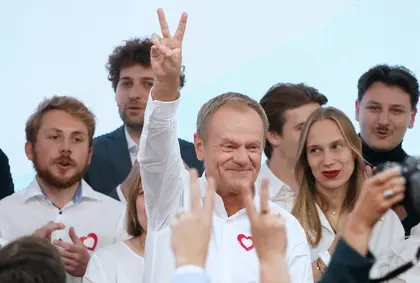According to the official results of the parliamentary elections in Poland, the conservative PiS has won the most votes but failed to secure the majority it needs to continue in government. Instead, three pro-European parties are set to form a ruling coalition: Donald Tusk's liberal Civic Platform, the left-liberal Trzecia Droga and the leftist Lewica party. Europe's press sees many challenges ahead.
Back to democracy
JOIN US ON TELEGRAM
Follow our coverage of the war on the @Kyivpost_official.
Petr Janyška in Deník N (CZ) heaves a sigh of relief:
“Poland is returning to democracy. Judges will no longer be persecuted for refusing to align their rulings with political orders, public broadcasters will no longer spread propaganda for a political party, women will hopefully soon be able to get an abortion legally and no longer have to fear pregnancy. Political decisions won't be made by an old man in his party's office but by the government and parliament. LGBT people will no longer be called degenerates by the highest authorities, and students will not be graded in religious education. And filmmakers will not be lynched by the prime minister and the government for making a critical film, as recently happened with director Agnieszka Holland.”
DePiSisation is a tough task
Historian Timothy Garton Ash describes the challenge of reversing PiS's capture of the Polish state in La Repubblica (It):
“I just learned a new Polish word: depisyzacja, that is, dePiSisation, by analogy with decommunisation. But taking the PiS out of the Polish state will be a tough task. It means restoring the independence of the courts, turning state media into proper public service media, undoing deep political penetration of the civil service and state-owned enterprises, redrawing constituency boundaries so they reflect population changes, and more. All this while Duda [Polish president and an ally of PiS] still has extensive veto powers. Restored EU funding will help, but no one knows the true condition of Poland's public finances and there's a war grinding on next door in Ukraine.”

Polish Support for Receiving Ukrainian Refugees Reaches New Low
Hoisted by its own petard
PiS only has itself to blame for its failure to secure a ruling majority, Der Standard (AT) notes:
“In a democracy, successful politics depend on a modicum of communication with differently-minded people. Precisely this capacity has been increasingly absent in PiS in recent years. Above all, by reforming the judiciary and repurposing the public media into a government propaganda machine, it curtailed a vital corrective that ultimately ensures the stability of the state as a whole. Such moves not only scare off voters but - should it fail to obtain an absolute majority - also potential partners.”
Record turnout sends strong message
LRT (LT) points to the high voter turnout:
“According to initial figures almost 73 percent of Polish voters participated in these elections, proving that they are not indifferent to the current geopolitical situation and the government's attitude towards democracy. It's telling that the four referenda held in conjunction with the elections, which were initiated by the ruling party, failed to achieve a sufficient turnout to make their results binding rather than merely advisory. The voters of the opposition forces simply boycotted them outright.”
Fiasco for Hungary's goverment
The EU will be a lonely place for Viktor Orbán now, Népszava (HU) predicts:
“This election is not only a defeat for PiS but a real hammering for Hungary's ruling party. ... The probable change of government in Warsaw means that Hungary will lose its last anti-EU populist ally. We will be alone in EU voting, we will be the only ones trying to blackmail the EU, and if the Hungarian population does not wake up, which hardly looks likely at present, we could find ourselves outside the EU pretty soon.”
Deep divides remain
The wounds of the election will not heal any time soon, fears Observator Cultural editor-in-chief Matei Martin (RO):
“Regardless of the election outcome and the political reorientation which is about to take place, what remains is the social reality. The turbulent election campaign will probably leave Polish society deeply divided for the foreseeable future. This political polariaation is not something that can be resolved overnight, especially since the new government will be in a hurry to implement the promised reforms. So the social division will remain or grow even deeper.”
No coalition options for PiS
The governing alliance lacks coalition options, comments the PiS-affiliated online portal wPolityce.pl:
“The United Right [PiS electoral coalition] has won the parliamentary elections. ... But it was pursuing a different goal, namely a parliamentary majority. Today that seems unrealistic - irrespective of the final result. The [far-right nationalist] Konfederacja's pitiful result also makes the search for a coalition partner a tremendous challenge. The only potential partner seems to be the [Polish People's Party] PSL, but given the current mood in the ranks of the opposition, even this is a mission with little chance of success.”
Presidential blockade not a good idea
If the president adopts a blockade stance vis-à-vis the new government it will not go down well with the people, Interia (PL) observes:
“Of course, the PiS can still extend its term a bit. President Andrzej Duda could give the formal winner the order to form a new cabinet, the procedures could drag on, but in the end whoever successfully forms a coalition government will take over, and the opposition can do that. Will the president block all the new government's reforms over the next two years? In the long run, this would not pay off for him, and perhaps he dreams of creating a new centre-right. Breaking away from the PiS would be advantageous for him.”
Poland bucking the trend
The first projections are likely to elicit a sigh of relief across the EU, says the BBC:
“Brussels had been deeply worried about Poland's election. Little was said in public. EU figures don't want to be seen as interfering in national votes, but behind closed doors there was a ton of euro-nail-biting. ... So far there is only an exit poll to go on, but Brussels is doubly delighted at the expected outcome as it apparently bucks a trend much-feared by the EU - the apparent renaissance of the Eurosceptic hard right across much of the bloc.”
Setback for the Visegrád hardliners
Corriere della Sera(IT) is thrilled:
“Today the negotiations begin, and with them the attempts to woo newly elected MPs - an art in which old Kaczyński is considered a master. It will take days to get clarity. The counting of votes from abroad, which historically favor moderates and where twice as many ballots were cast as in 2019, will also play a big role. But whatever the outcome, as of yesterday Poland no longer has a Eurosceptic overlord. For one night at least, the Visegrád fortress and the ideological alliance with Orbán's Hungary seem to have receded into the distance.”
A return to good relations
Yuri Panchenko of Ukrainska Pravda writes:
“First of all, the fact that our neighbor's elections are over is a good thing for Ukraine. It means that the campaigning will no longer affect relations between Kyiv and Warsaw. Regardless who wins, we can hope for a compromise on the grain dispute - the Polish government has already described Kyiv's proposals as good, but a final decision was not possible before the elections.”
See the original here.
You can also highlight the text and press Ctrl + Enter






